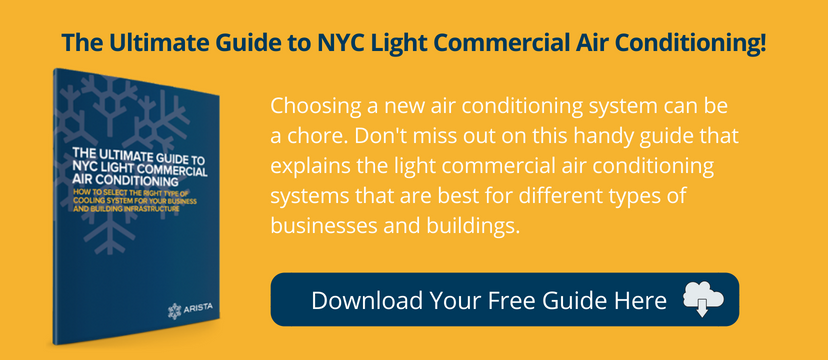When you need a new commercial air conditioner, business owners and facilities managers often have no idea how to make the right choice. Like you might when buying a car, a computer or some other technology item, you might start researching brands to see which one gets the best reviews.
These are some of the top-rated commercial air conditioner brands:
- Daikin
- Trane
- Carrier
- Mitsubishi
- McQuay
That being said, it’s important to know that brand isn’t everything when it comes to choosing a commercial air conditioner. Keep reading to learn about other important factors to consider.
Why brand isn’t everything
Arista services, repairs, and installs all commercial air conditioner brands. Over the years, we have worked with just about every one. In our experience, the top commercial air conditioner brands all have good quality standards and can give you decades of reliable service.
However, there are other important factors you should consider to choose an air conditioner that will perform well for your commercial space.
4 factors for choosing the best commercial air conditioner
1. TYPE
When you’re looking at commercial air conditioner units, you should start with choosing the best type of technology for your needs and your space.
Water-cooled. If your building has a water-cooled base system, you’ll need to install equipment in your space that ties into the building’s base system and distributes the chilled water throughout your space.
Ducted split system. This is the traditional type of air conditioner used in single family homes. It has an outdoor condensing unit and a single indoor air handler. It distributes cooled air throughout your space using ducts (often the same ducts that service the heating system). If you already have ducts in your space, this can be a good option for a commercial air conditioner as well.
Mini-splits. If you don’t have ducts, installing them in an older building can be challenging and expensive. In that case, you can consider a commercial ductless air conditioner that has multiple indoor air handlers in each room. This type of air conditioner is also a good choice for supplementing an existing system (for a computer room, for example).
Variable refrigerant flow/volume (VRF/VRV). This technology is different from a traditional split system. Rather than always operating at full capacity, it can adjust to the operating conditions. That means it’s quieter and more energy-efficient. You can create independently-controlled cooling zones. Like mini-splits, it also can be installed without ducts.It can even provide both heating and cooling simultaneously to different areas within your space.
Learn more: 7 Reasons to Choose VRF Technology for Your New Air Conditioning
Rooftop unit (RTU). An RTU provides both heating and air conditioning in a single packaged unit. As the name implies, it’s typically installed on the roof of your building. It’s a great choice for single-story buildings such as warehouses.
Learn more about the different commercial air conditioner types (and which work best for different types of buildings and businesses) from this free guide:
2. CAPACITY
Getting the right commercial air conditioner cooling capacity is critically important to how well the unit will perform. Make sure the vendor you choose is calculating it correctly. Some will do it purely based on the square footage of your space, which is not best practice. Instead, they should do an analysis of your space and operating conditions to determine the capacity you need.
3. DISTRIBUTION
Even if you buy the best commercial air conditioner out there, you can end up with poor performance if your system is not properly designed. For example, if you have a ducted system, the ductwork layout is critically important. If you have a ductless system, the air handlers must be placed in the right locations.
Learn more: Improve Air Conditioning: Avoid These Ductwork Design Mistakes
4. INSTALLATION QUALITY
Here’s the most important factor that business owners and managers may not know: commercial air conditioner installation makes all the difference between a poorly performing unit and one that gives you reliable cooling for decades.
There are so many installation mistakes that can hinder the performance of your commercial air conditioner. Make sure you hire qualified HVAC experts to design and install your system. TIP: If you’re installing new AC as part of a renovation, make sure your builder hires experts.
Learn more: High Quality HVAC System Installation Checklist for System Owners
One more critical factor ensures reliable performance
If you want reliable comfort, problem-free operation, and energy efficiency from your new air conditioner (who doesn’t?), there’s one more thing you have to do.
Get regular preventative maintenance for your commercial air conditioner.
Why is this so important? It’s like getting the oil changed on your car. It keeps the parts in good working order and prevents small problems from turning into big ones. You also get filters changes, drains cleaned, and coils cleaned, which keeps your air conditioner working efficiently. The fact is, equipment that’s maintained regularly lasts longer and has fewer repair issues.
Ready for a new commercial air conditioning system in NYC? Contact Arista today.


